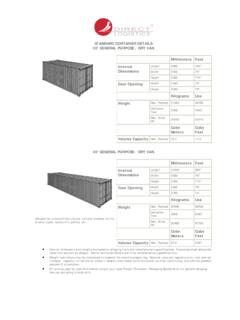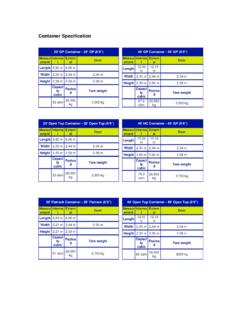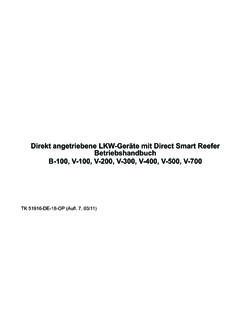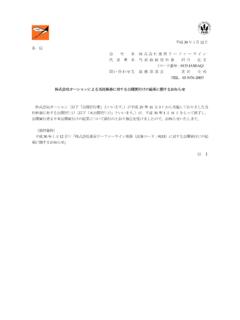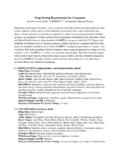Transcription of Factsheet 4: The ‘Cresswell’ Principles of Expert Evidence
1 Expert SUPPORT SERVICES FROM THE UK REGISTER OF Expert WITNESSESE xpert Witness Factsheet 4J S Publications, PO Box 505, Newmarket CB8 7TF Telephone (01638) 561590 J S Publications 2009 Factsheet 4: The Cresswell Principles of Expert EvidenceLast updated: 21 July 2000 The Principles of Expert Evidence which Mr Justice Cresswell laid down in his judgment in the shipping case known as TheIkarian Reefer ([1993] 2 Lloyd s Rep. 68) have become widely accepted as a classic statement of the duties and responsibilitiesof Expert witnesses. They were endorsed by the Court of Appeal, commended by Lord Woolf in his report on the civil justicesystem in England and Wales, and have been cited with approval in several subsequent cases.
2 This is not to say, though, thatthey have won complete acceptance, as the following discussion shows. It is based on an article by Anthony Speaight QC,which first appeared in the New Law Journal and was then abridged, with the author s permission, for publication in seven Principles of Expert Evidence which Mr JusticeCresswell set out in The Ikarian Reefer have several timesbeen cited as the classic statement of good practice forexperts, most recently in Boroughs Day -v- Bristol CityCouncil. There can be no doubt that the judge s strictures onexperts in this case were justified, but before the IkarianReefer Principles become, so to speak, set in stone asunchallengeable pillars of wisdom, we ought to examine therespects in which they may fail to grapple with unresolvedcontradictions in the role of the Expert in litigation.
3 Let usconsider the Principles Expert Evidence presented to the court should be, andshould be seen to be, the independent product of theexpert uninfluenced as to form or content by theexigencies of this simply meant that an Expert ought to express the sameopinion on a given issue irrespective of which side wascalling him, then most of us would warmly agree. However,in stating that both form and content should be uninfluencedby the exigencies of litigation the proposition goes form first. How can an Expert report not beinfluenced by the fact that it is to be used in litigation?Litigation reports differ from those produced for otherpurposes in a number of ways, most importantly because theyshould surely be directed to the matters in issue on whichexpert Evidence is admissible.
4 In my view it is not onlyproper but desirable for lawyers to identify for experts theissues on which their opinion is sought. To my mind, a crispexpert report will set out the questions posed by the lawyersand confine itself to answering them. Therefore, the form of auseful Expert report will be very much dictated by the contextof its requirement for a particular proposition that the content of the report should beuninfluenced by the exigencies of litigation may sound morereasonable. But, in fact, behind this bland statement lies aprofound difference of opinion as to the propriety of lawyerinvolvement in the drafting of reports. Imagine thehypothetical case of an obstetrician accused of pulling toohard on forceps. The defendants receive a report from theirmedical Expert which contains these two passages: (1) in myopinion he did not pull too hard but he did pull for too long,and this ultimately produced the same mischief as pulling toohard would have done , and (2) in the ensuing Caesareansection operation his stitching was thoroughly careless,causing unnecessary later pain.
5 In my view it would be wrong for a lawyer to suggest thatpassage (1) be modified by, for example, cutting out all thewords after he did not pull too hard ; for such an excisionwould do violence to the witness s full expression of opinionon the question as to whether the pulling was negligent. Onthe other hand, I would consider it perfectly proper for alawyer to ask the Expert to omit passage (2) entirely if theplaintiff had pleaded no allegation of negligence in theperformance of the later operation. Parties to litigation areunder no obligation to tell their opponents how they couldimprove their cases, and in such a situation it would be thelawyer s duty to his client to endeavour to have passage (2)removed before the report was , to the extent that the content of Expert reportsshould be confined to the questions posed to the Expert , thecontent as well as the form may on occasions be influencedby the requirements of An Expert witness should provide independentassistance to the court by way of objective unbiasedopinion in relation to matters within his expertise (seePolivitte Ltd -v- Commercial Union Assurance).
6 Anexpert witness in the High Court should never assume therole of an should certainly provide objective unbiased opinions,and equally certainly they should not act as , the giving of unbiased opinions is not quite thesame thing as providing independent assistance to the court .Experts are called by one party or the other, and are paid byone of the parties. They are engaged not only to giveevidence in the witness box, but also to give out-of-courtadvice to the party engaging them. And, indeed, on looking atMr Justice Garland s judgment in the Polivitte case one findsthat he gave a rather more balanced picture of the Expert srole: I have almost considered the role of an Expert to betwo-fold: first, to advance the case of the party calling him,so far as it can properly be advanced on the basis ofinformation available to the Expert in the professionalexercise of his skill and experience; and secondly, to assistthe court, which does not possess the relevant skill andexperience, in determining where the truth lies.
7 3. An Expert witness should state the facts or assumptionsupon which his opinion is based. He should not omit toconsider material facts which could detract from hisconcluded statement is fine, so long as the reference to not omittingwhat could detract from the opinion is limited to thequestions actually posed to the Expert . As the late and greatlyrespected Official Referee, Judge John Newey QC, oncewrote: Since the procedure in both courts and arbitrations isadversarial, an Expert is not obliged to speak out, or write inhis report, about matters concerning which he has not beenasked. Expert SUPPORT SERVICES FROM THE UK REGISTER OF Expert WITNESSESE xpert Witness Factsheet 4J S Publications, PO Box 505, Newmarket CB8 7TF Telephone (01638) 561590 J S Publications 20094.
8 An Expert witness should make it clear when aparticular question or issue falls outside his The Ikarian Reefer case reached the Court of Appeal,Lord Justice Stuart-Smith qualified this statement from thejudgment of the Divisional Court by saying that anexperienced fire Expert must be entitled to weigh theprobabilities. This , he said, may involve making use of theskills of other experts or drawing on his general mechanicalor chemical knowledge. 5. If an Expert s opinion is not properly researchedbecause he considers that insufficient data are available,then this must be stated with an indication that theopinion is no more than provisional. In cases where anexpert witness who has prepared a report could not assertthat the report contained the truth, the whole truth andnothing but the truth without some qualification, thatqualification should be stated in the report (see Derby -v-Weldon).
9 The remarks of Lord Justice Staughton in the Derby -v-Weldon case are worth quoting more fully, because theyintroduce a different, and more realistic, nuance: I do notthink that an Expert witness, or any other witness, obligeshimself to volunteer his views on every issue in the wholecase when he takes an oath to tell the whole truth. What hedoes oblige himself to do is to tell the whole truth about thosematters which he is asked about. 6. If, after exchange of reports, an Expert witness changeshis view on a material matter having read the other side sexpert s report or for any other reason, such a change ofview should be communicated (through legalrepresentatives) to the other side without delay and whenappropriate to the is a radical idea.
10 I have never had the experience ofopponents telling me or my solicitors that their Expert hadchanged his view on something since service of his have I ever heard of it happening to others. So thisprinciple hardly reflects existing practice. That is not to saythat there may not be good arguments in favour of itsadoption, but they require careful general, a party to litigation is under no obligation toreveal to the other what his prospective witnesses will the contrary: witness statements are , rules of court have in practice modified the scopeof that privilege, by providing that leave to call experts maybe made conditional on the substance of their Evidence beingdisclosed to the other side in the form of a written can quite see that if an Expert changed his mind on asignificant matter between writing his report and its service tothe other side, the report should be amended before it isserved.
